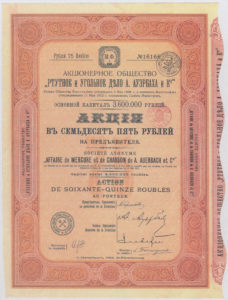
Société Anonyme “Affaire de Mercure et de Charbon de A. Auerbach et Cie”
Акционерное Общество “Ртутное и Угольное Дело А. Ауэрбаха и Ко.”
Other city spellings: St.-Pétersbourg, Petrograd, Pétrograde
Formed in 1896 with head office in St. Petersburg. Initial capital was 2,250,000 roubles in shares of 187.50 roubles. In 1911, capital was reduced to 225,000 roubles by writing off 2,025,000 roubles from the balance sheet. Shareholders exchanged four (old) shares of 187.50 roubles for one new share of 75 roubles, giving 3,000 new shares. In 1912, capital was increased to 3,600,000 roubles in shares of 75 roubles.
1896
Description
The founder of the company, Alexander Andreyevich Auerbakh, graduated from the Institute of Mining Engineers in St. Petersburg in 1863 and was engaged in the exploration of mineral deposits, in particular, the exploration of coal deposits in the Moscow region, Tula and Donbass. Being a well-known developer of mining industries, Auerbach accepted the offer to head the Ural mining district Bogoslovskoye in the Perm province. These lands turned out to be rich in copper and within 15 years Auerbach was able to develop this region. This was helped both by internal factors (modernization of equipment, organization of production, development of new iron ore deposits) and external (favorable market conditions in the the construction of the Siberian railway, which required a large number of rails).
Unexpectedly, in 1885, Auerbach decided to deal with mercury deposits. Together with his colleague, A.V. Minenkov, he discovered a mercury deposit in the Yekaterinoslav province. In 1885, Auerbach created the A. Auerbach and Co. Mercury Production Association, which included A. Minenkov, V. Polovtsev, A. Evdokimov, I. Doss, D. Stasov. On leased lands, Auerbach organized the development of mercury ores, built a factory and a settlement. He designed furnaces for melting mercury, which have a number of advantages over imported analogues. If earlier Russia had imported 4,000 poods of mercury, now it has begun to export 28,000 poods per year.
In 1889, the Partnership bought a coal mine from the local landowner Fursov. Later, two mines appeared on the site of the mine – “Maria” and “Lyudmila” (named after the daughters of Auerbach). But in 1895, the Partnership had financial problems related to the capital costs of expanding the mine. To raise funds, it was decided to incorporate the enterprise. At the general meeting in May 1896, the charter of the joint-stock company Mercury and Coal Business of A. Auerbach and Co was approved, the fixed capital of which was determined at 2,250,000 rubles, distributed in 12,000 shares of 187 rubles each. 50 kop. for each.
Auerbach became Managing Director, receiving 3,560 shares. He decided to make coal production the leading one in the activities of the Society, since the development of coal gave a more stable profit. The director planned to increase coal production to 7-10 million poods a year. All profits were directed to the development of the mine, near which a sorting and coal washing plant was built, and a water supply system was installed.
However, the crisis of 1900-1903 led to a decrease in demand for coal and metal, and, consequently, to a decrease in prices and a reduction in production. Under these conditions, Auerbach paid wages to workers from his own funds. But this could not last long and soon Auerbach declared himself bankrupt. The mercury mine and coal mines closed.
Nevertheless, in 1912, in the wake of the all-Russian economic recovery, the Azov-Don Bank helped the joint-stock company. The fixed capital grew to 3.6 million rubles, the exploitation of coal mines resumed, exploration of mercury ores took place. However, the prosperity did not last long. After the revolutionary events of 1917, the A. Auerbach and Co. Mercury and Coal Business ceased operations, and in January 1918 the enterprise was nationalized. But the director of the Society died in 1916 before the revolution. (Source:CentroCredit Bank website; Authors: Tsvetkova Elena Alexandrovna, Tsvetkov Vasily Zhanovich)

